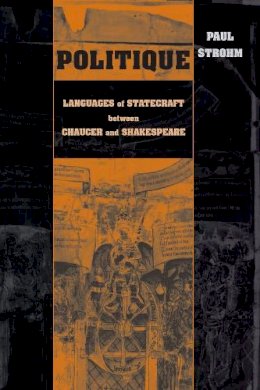Paul Strohm is William B. Ransford Professor of Medieval Literature at Columbia University.
"Taking points of departure from Quentin Skinner and J.G.A. Pocock, Paul Strohm deploys superior powers of textual and linguistic analysis to uncover a "pre-Machiavellian moment": an historical phase which saw political discourse deployed with unprecedented slipperiness and subtlety; a time when it was thought possible not just to follow Fortune, but to jam her turning wheel. That this should have occurred in the fifteenth century, a period regarded as too dull, tradition-bound or chaotic for significant discursive innovation, is just one of the surprises of this remarkable book. Little-regarded writers such as Fortescue and Pecock, Whethamstede and Warkworth, emerge as figures of compelling interest; John Lydgate, once dismissed as Chaucer's dullest successor, opens paths to the Mirror for Magistrates and to the heart of Shakespearean history. This book is recommended to scholars and students of medieval and Renaissance history and literature and to all those fascinated by languages of conspiracy, destiny, and government." —David Wallace, University of Pennsylvania "With his latest book, Paul Strohm has broken new ground again, showing us how the neglected fifteenth century constitutes a historical linchpin for changes in ideas about statecraft, political philosophy, and representation. Central to Strohm's argument are the language of statecraft and the social and literary forms through which it was deployed. He brilliantly analyzes a series of keywords like politique, pollecie, and faction in order to uncover the newness of late medieval political discourse and its links to both medieval forms and Renaissance political thought. Crucially, Strohm demonstrates that late medieval and early modern writers, poets, and artists were invested to an unprecedented extent in the idea of human agency in history. His pinpoint excavation of this entire strand of political thought and his virtuoso analysis of written and visual attempts to represent it will transform the way scholars and critics read the transition between the periods, allowing readers to traverse with him the boundaries between pasts and the present." —Maura Nolan, University of Notre Dame "Once again, Strohm . . . has written what is sure to be an often-cited study, and thus a significant scholarly step forward in the field of fifteenth-century English literature, politics, and historiography. . . . Strohm masterfully illustrates the artistry of late-medieval English statecraft." —Choice "Paul Strohm explores selected fifteenth- and sixteenth-century literary and historical texts, observing political attitudes and terminology as both changed under pressure from the vicissitudes of unstable royal government and focusing mainly on England's pre-Machiavellian movement, 1450–85, roughly the era of the Yorkist-Lancastarian dynastic wars. . . . Not the least of the pleasures of this book are Strohm's abilities to cut back and forth between Tudor and the later medieval and to write in a style that is clear and accessible." —Speculum “Given the accomplishment and continued influence of Strohm's other books, a new one brings with it a great deal of expectation, and, overall, Politique stands as a worthy and apt addition to his oeuvre . . . Political historians of this period have, with this book, an indispensable resource, and literary scholars have, as well, a compelling provocation to continue the reassessment of the writings of fifteenth-century England.” —Modern Philology “Paul Strohm's Politique is an important and challenging revision of scholarly attitudes towards the fifteenth century, specifically the period of the Yorkist-Lancastrian dynastic struggles from 1450 to 1485. . . . For any scholar interested in the political texts and contexts of the fifteenth and sixteenth centuries, Politique will be essential reading.” —Mystics Quarterly “This book will prove useful not only to scholars of the fifteenth and sixteenth centuries, but to all interested in political rhetoric. . . . Strohm’s illuminating study reveals the oft-undervalued political and literary discourses of the mid-fifteenth century to be both ambitious and provocative. Undoubtedly, scholars will hail Strohm’s book with the same honors.” —Sixteenth Century Journal “'Discourse' and 'language' represent two current and fruitful approaches to understanding political thinking and actions in fifteenth-century England, displacing 'medieval' and 'renaissance' or 'early modern' and the baggage which they have accumulated over a century and a half. This book is a seductive search for roots of language and political attitudes rather than a rounded analysis of fifteenth-century political thinking and behaviour.” —English Historical Review

